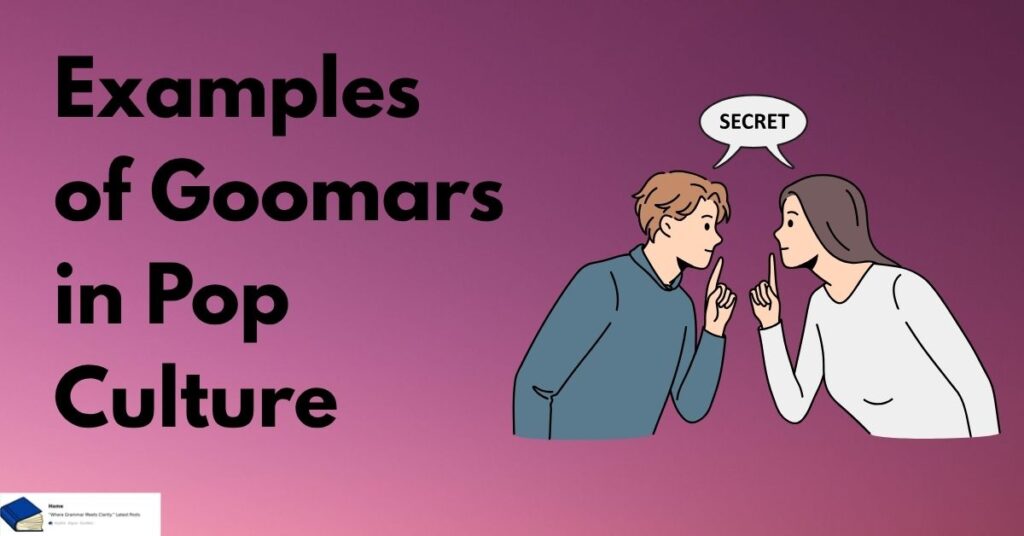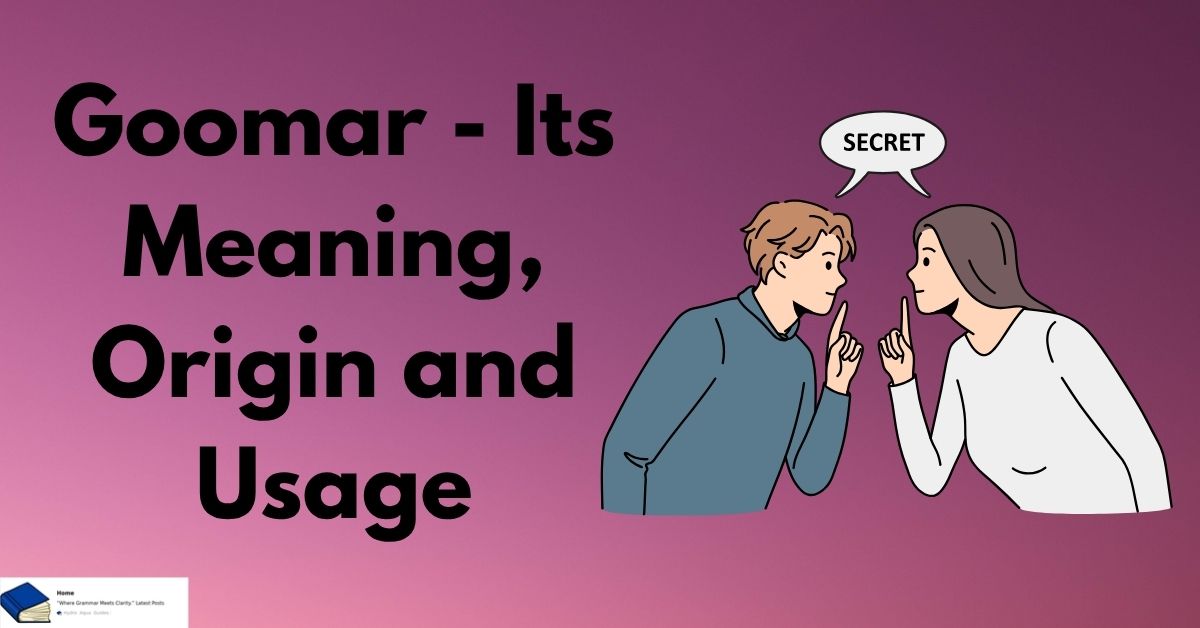You’ve probably heard the word “goomar” tossed around in mafia movies or TV shows like The Sopranos, and thought Wait… what’s a goomar? Is it just slang? A nickname? Or something more… secretive?
Let’s dive into the complex, cultural, and surprisingly emotional world of the goomar a term rooted in Italian-American mob life, oozing with implications of romance, secrecy, and tradition.
What Does Goomar Mean?
The term goomar (sometimes spelled goomah) is a slang term derived from the Italian word comare, which traditionally means “godmother.” But in Italian-American slang, particularly within the organized crime world, the meaning has evolved dramatically.
So, what does goomar mean now?
In simple terms, a goomar is a mobster’s mistress the other woman. She’s not the wife, but she plays a significant, sometimes emotionally intimate role in the mobster’s life.
Think of her as the side piece in mob life not just for physical reasons, but often an emotional escape too.
Goomar Meaning: From Comare to Cultural Code
Let’s rewind a bit.
The original Italian word comare was a term of endearment for a close female friend or godmother. In Southern Italy, it could also mean “midwife” or “female companion.”
But when Italian immigrants brought their language to the U.S., words morphed in sound and meaning. Comare transformed phonetically into goomar or goomah, and over time, its connotation changed from innocent to illicit.
By the mid-20th century, especially in Italian-American mob culture, a goomar no longer referred to a godmother but to the mobster’s mistress.
What Is a Goomar in Mafia Culture?
In mafia circles, the goomar became an accepted yet secret aspect of mobster relationships. The mob may be strict about loyalty, but when it came to personal relationships, many male members had both a wife and a goomar.
These weren’t casual flings.
- A goomar could have her own apartment sometimes even paid for by the mobster.
- She might get expensive gifts, vacations, or nights out at exclusive clubs.
- Her existence was often an open secret among other mob members and even among their wives.
So when people ask, “What is a goomar?”, the answer isn’t just “a mistress.” It’s more like a recognized emotional and physical partner outside of marriage within mob life.
Goomar vs Mistress: Is There a Difference?
That’s a great question and the answer is yes.
All goomars are mistresses, but not all mistresses are goomars.
A mistress is a general term for a woman involved in a romantic and/or sexual relationship with a man who is married. It can occur in any culture.
A goomar, however, is:
- Specifically tied to Italian-American or mob culture
- Often publicly acknowledged within the mob
- Sometimes treated with semi-official status
- A long-term affair, not just a fling
In many ways, the goomar can be seen as a cultural institution within mob life.
Examples of Goomars in Pop Culture

You don’t have to dig too deep in film and TV to find goomars.
Let’s explore a few iconic examples:
The Sopranos Goomar
If you’ve seen The Sopranos, you already know this term.
Tony Soprano’s mistress, Gloria Trillo, was one of the most well-known goomars in television history. She was passionate, dangerous, emotionally volatile and deeply important to Tony in ways his wife Carmela wasn’t.
Tony didn’t just cheat. He lived two lives. And Gloria was a key part of the one that existed outside his home.
This portrayal cemented the goomar meaning in modern pop culture.
Goodfellas and Janice Rossi
Another prime example? Janice Rossi in Goodfellas the goomar of mobster Henry Hill.
There’s even a famous scene where Henry’s wife Karen bangs on Janice’s apartment door screaming, “There’s a whore living in 2R!”
Janice wasn’t just a one-night stand. She had her own place, was known among Henry’s friends, and was a full-blown mob mistress.
Why Did Mobsters Have Goomars?
It wasn’t just about lust. There’s a deeper explanation rooted in:
- Cultural gender roles
- Emotional detachment
- Power and image
Mobsters often married “respectable” women who could handle domestic duties and raise children. The wife was the homebase. But the goomar was the escape.
She provided:
- Freedom from family obligations
- Validation and admiration
- A space for emotional vulnerability away from the rigid expectations of being a husband or father
To the mobster, a goomar wasn’t just a sexual partner she was a different life entirely.
The Rules of Being a Goomar
Being a goomar came with unspoken rules:
- Discretion was key – No public fights, no calling the wife.
- No jealousy – A goomar had to accept she wasn’t the only woman.
- Unspoken loyalty – She couldn’t date around or embarrass the mobster.
- Know your place – You could be important, but never “the wife.”
Breaking these rules could result in a brutal end to the relationship or worse.
The Emotional Side of Goomar Life
Not all goomars were happy side chicks living lavishly.
Many felt:
- Neglected during holidays and family events
- Second-best when the mobster returned home
- Powerless, despite being a part of a dangerous world
Some, like Gloria in The Sopranos, spiraled emotionally, unable to handle the limitations of the role.
That’s where the phrase “emotional affairs in mafia culture” comes into play. It wasn’t all sex and seduction. It was often tangled with attachment, pain, and identity.
Goomar in Pop Culture Today
Beyond The Sopranos and Goodfellas, the goomar has become shorthand in pop culture for:
- The Other Woman
- A secret love interest
- A side relationship filled with passion and danger
From memes to podcasts, the word is now a cultural reference point.
Some modern viewers even joke about having a “goomar situation” when describing emotional cheating or double lives in relationships whether mob-related or not.
Is Goomar Still Used Today?
In modern Italian-American communities, the word “goomar” is rarely used in real life anymore at least not openly.
However, it lives on in media, pop culture, and mafia fan circles.
You might hear it on a podcast dissecting mob movies, in Mafia TikTok lore, or even in playful conversations among friends joking about having “a goomar on the side.”
In that sense, the term has shifted from a serious cultural role to a slang reference with humorous or dramatic flair.
Goomar vs Mob Wife: A Sharp Contrast
Let’s make this clear:
| Trait | Mob Wife | Goomar |
|---|---|---|
| Social Status | Public, respected | Secret, unofficial |
| Role | Domestic, mother, family manager | Emotional/sexual escape |
| Recognition | Within family and community | Hidden from public eye |
| Loyalty expected | Absolute | Unspoken, but assumed |
| Risk | Betrayal = divorce | Betrayal = possible violence |
This comparison shows the high stakes involved in playing either role.
Cultural Evolution: From Comare to Goomar
So how did comare become goomar in the first place?
- Comare (pronounced koh-MAH-ray) was softened and Anglicized by American ears.
- In Southern Italian dialects, it morphed phonetically to goomar or goomah.
- It became street slang in urban centers like New York, Boston, and Chicago.
Today, some say the term has faded. Others argue it’s still whispered in old-school Italian enclaves, passed down with a smirk and a wink.
Conclusion
So, what’s a goomar? She’s not just a side piece. She’s a cultural symbol equal parts scandal, affection, and mafia mythology.
Understanding the goomar meaning gives us a glimpse into a time when relationships were governed by unwritten rules, mob loyalty, and emotional duplicity.
Whether you’re fascinated by mob culture, a fan of The Sopranos, or just curious about Italian-American slang, the goomar remains a colorful character in both real and fictional worlds.
FAQ’s
What does goomar mean in Italian-American slang?
A mistress or side woman, especially in mafia culture, derived from the Italian word comare.
Is goomar the same as mistress?
Not exactly. All goomars are mistresses, but goomars are tied specifically to mob culture and often have semi-official status.
Why did mobsters have goomars?
To escape family obligations, seek emotional freedom, or maintain dual lives.
Are goomars still a thing?
Not as they were historically. Today, the term is more pop culture slang than real-life usage.









